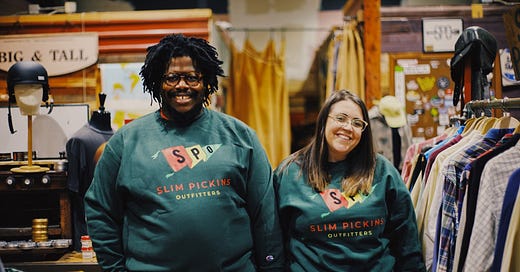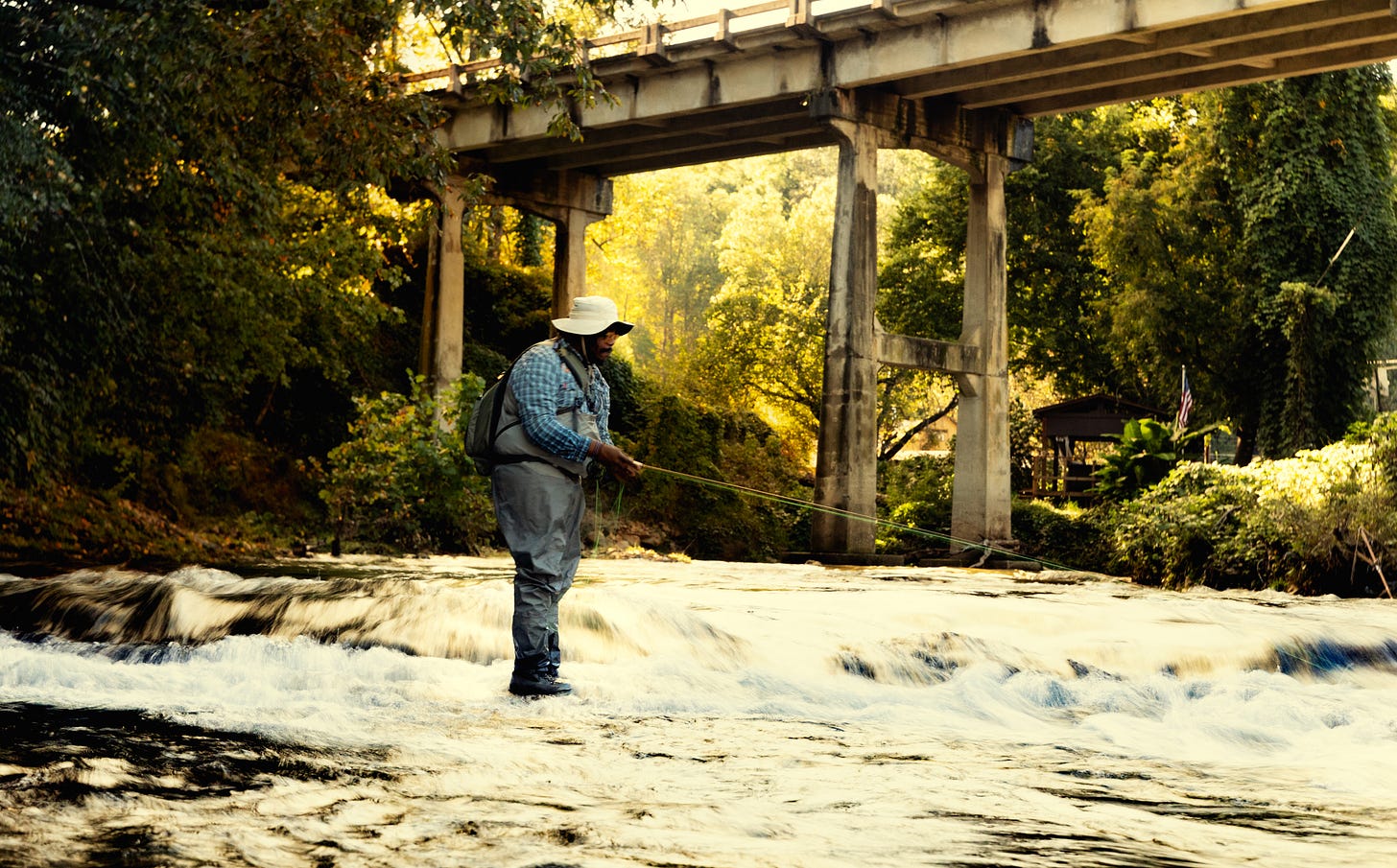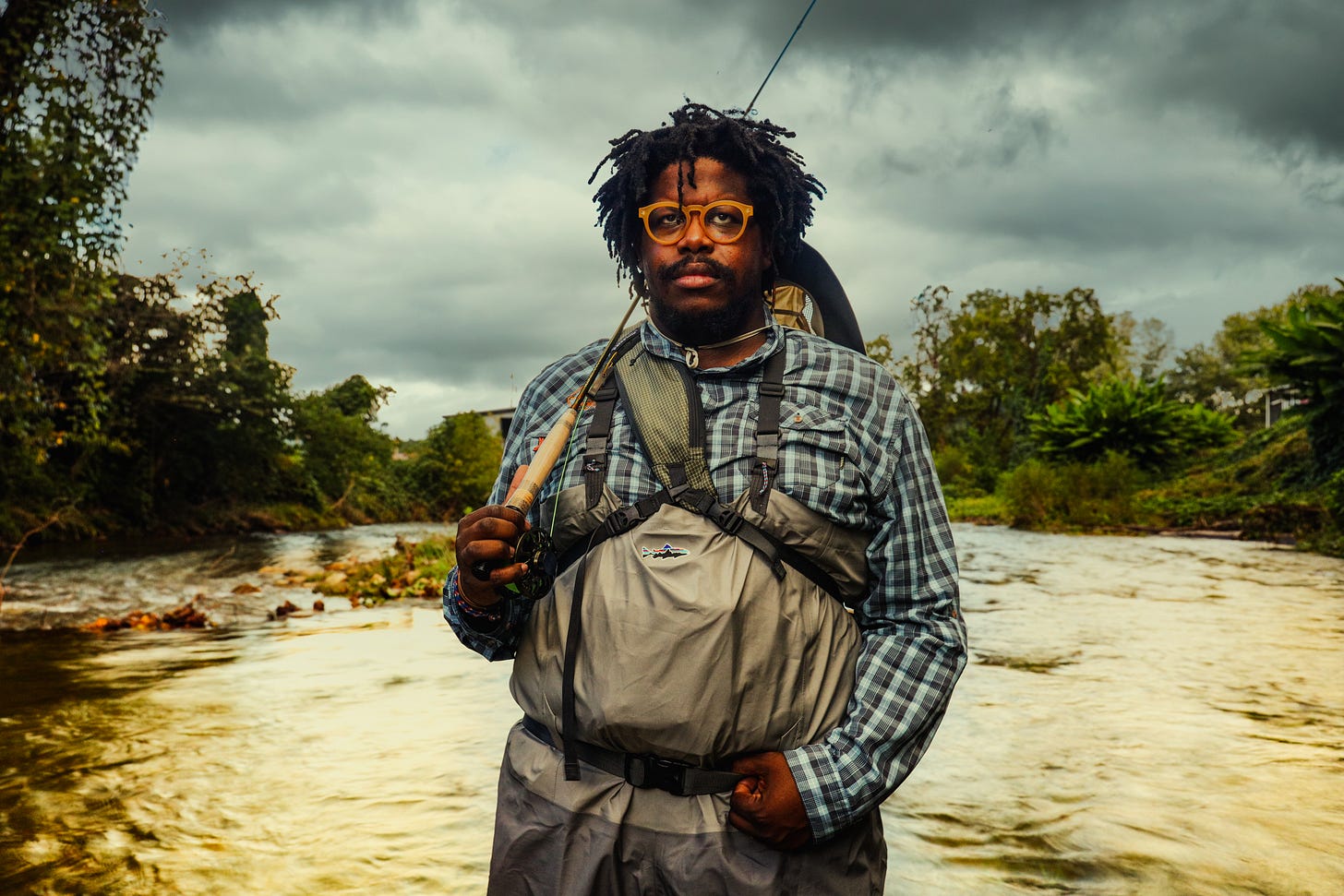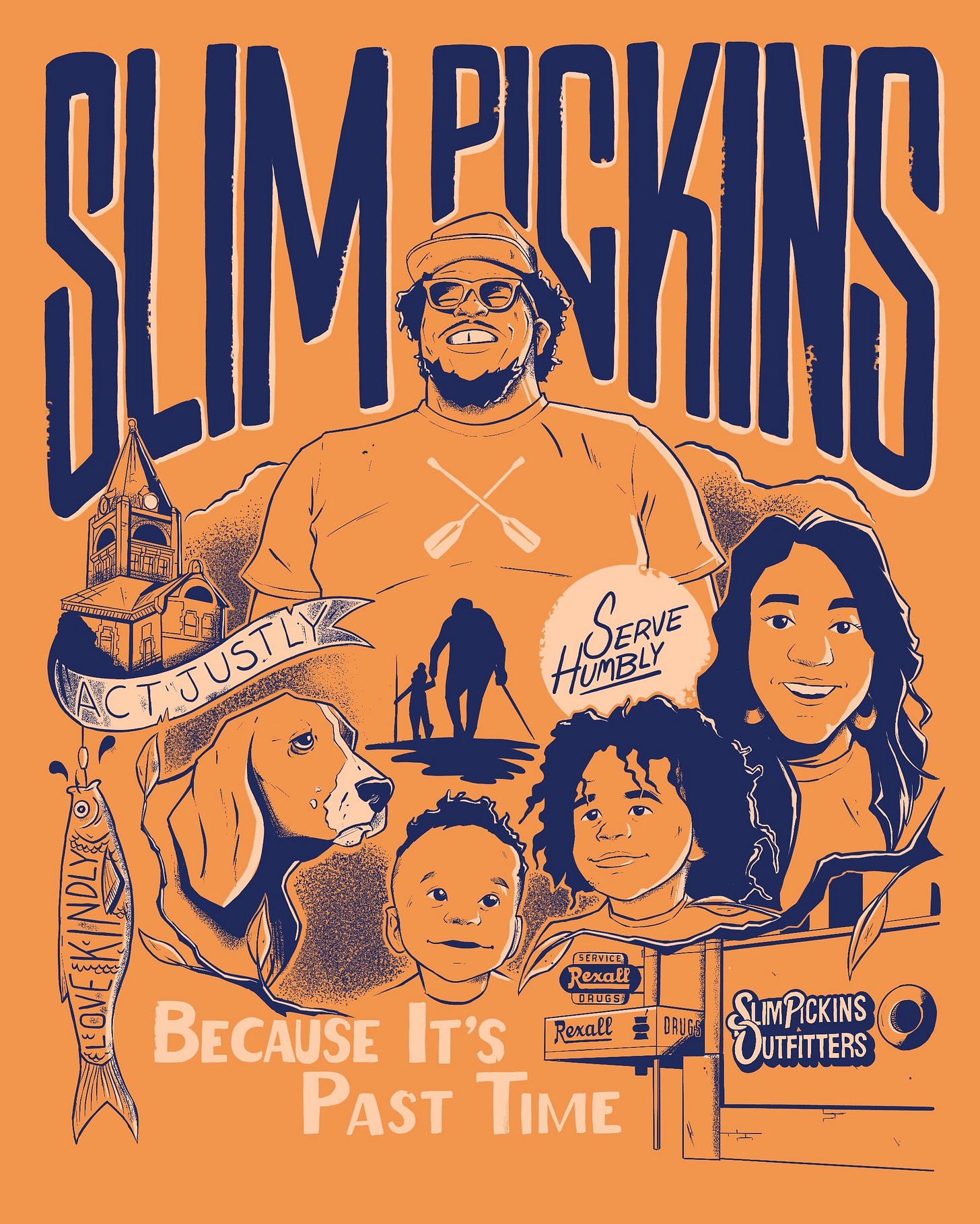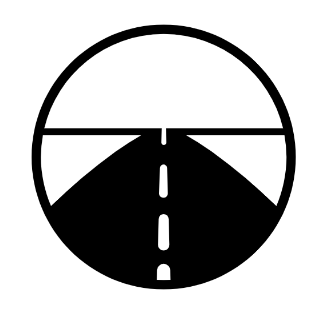Path #4: Slim Pickins Outfitters
Life lessons from the founders of the first Black-owned outdoor gear shop in the US.
Desire Paths is a newsletter about the wild, winding, lesson-filled lives of fascinating people. Thanks for coming on the journey.
Welcome back to DESIRE PATHS.
In Feb 2020, Kim and I got married at a small civil ceremony in London, where we lived, but Covid cancelled our big wedding (twice) and also our honeymoon to Japan. So, last week we travelled to O’ahu for an extremely delayed celebratory trip and readers, let me tell you, wow. Hole-in-the-wall gems, indie shops around every corner, godly poke & Kona coffee. It was my first time there and won’t be my last.
I also visited Waiahole Poi Factory and did a fun Desire Paths interview with owner Liko Hoe, who turned his parent’s roadside art gallery into a bastion of traditional Hawaiian food. Keep an eye out for that one soonish...
But first, today’s edition. Heather and Jahmicah from Slim Pickins Outfitters are the real deal and I’m so happy to share their story. We talk about setting up their outdoor gear & clothing shop, what success means, changing narratives, and life’s curveballs.
P.S. If you’ve been enjoying Desire Paths, I’d absolutely love if you’d subscribe or tell a friend. My goal is to build a special community here and any part you can play in that growth, well, I’d be forever grateful. Thanks! And enjoy,
—DG
I’m Danny Giacopelli, an editor, photographer, traveller and small business fan. By day I’m Editor-at-Large for Courier magazine. This is my personal newsletter, Desire Paths.
Desire Paths is based on the idea that the most fulfilled, fascinating people in the world are those who look at the boring, comfortable, predictable path they could take in life and say nope. Instead, they chase after risky dreams, change careers, make unconventional decisions, or cross oceans to start something new.
I dig deep with these people and share everything I learn with you. Let’s go.
#4: Jahmicah and Heather Dawes
“This thing that we've been put on Earth to be stewards of and advocates for, it's already going away. But if we limit the amount of people who have access to it, then we’re also limiting the amount of people who can stand up to protect it.”
‘The first Black-owned outdoor shop in the US’
How utterly wild that this sentence became true only a few years ago. The store in question is Slim Pickins Outfitters. It opened its doors in Stephenville, Texas (population 21,816) in 2017. And it’s run by Jahmicah and Heather Dawes.
I first stumbled into the magic of Heather and Jahmicah via a short film in which they shared their story. I was transfixed. And I knew I had to talk with them myself.
What I enjoyed most about our conversation was just how honest they were about how messy the SPO journey’s been. It’s refreshing, because it’s reality. That’s how it always is. Don’t let the ‘zero to millionaire’ success stories fool you. This stuff is hard. “I kind of despise the term small business,” Jahmicah told me, “because I know the effort, innovation, creativity and work involved is anything but small.”
Ultimately, ‘the first Black-owned outdoor shop in the US’ doesn’t tell their full story. As Jahmicah explains below, SPO is ‘Black-owned, but woman-run’. Heather and Jahmicah are a true team.
There’s no Slim Pickins Outfitters without both of them, together.
Read on for their story…
I’m psyched to finally talk with you guys. What drew you to the outdoors?
Heather: Us too, thanks! I didn't grow up outdoorsy, I just grew up outside. My parents are into organic farming and gardening, and my dad is one of those people who could survive off the land for years. We would go camping and sleep on a flatbed trailer with a mattress on top. But when I got older, I thought I didn’t really qualify as outdoorsy, because I didn’t do all the things other people do, like super long through hikes. My friend joked, like, ‘What did you think? You're not outdoorsy because you're not wearing zip-off pants?’ And I guess… yes, that's what I thought!
But before we opened the shop, I realized you don't have to be a skilled outdoorsman, you just have to go outside! That's all it takes to be outdoorsy: to be outside.
Was it the same for you, Jahmicah?
Jahmicah: There’s the reality and the marketing story. Heather grew up outside and yet the marketing from brands was so powerful that it convinced even someone like her that she didn't fit in. My experience was a bit more traditional. Both of my parents were in the Scouts. My dad's originally from Jamaica. His dad was into farming. What drew me outside was my love of animals and also wanting to follow in dad's footsteps. So I became a Scout. And I'll just say that that didn’t last long.
Overall, it wasn't a good experience. It's not that I didn't enjoy certain moments, but it was also the first place where I experienced racism. It was like, man, if these are the stewards or representatives of the outdoors, then... it wasn't even that I didn't belong there, it was that I didn't know if I wanted to even be there. But at the same time, even though the Scouts was the first place I experienced racism, it was also the first place I experienced accountability for it.
Can you elaborate a bit on that?
J: I remember the scoutmaster's son said something to me and my older brother, who was always my advocate and protector. That night when we got home, the scoutmaster showed up at our house with his son. My dad opened the door, my brother stepped out, and I was peeking from behind. So it was, like, this is reality and what people think, but also here's accountability and forgiveness, too. People make mistakes. I was grateful because I was exposed to this reality, but I was also taught a lesson on how to handle it. My dad could have slammed the door in his face. But he knew I was behind the door. He was teaching his sons how to respond.
Did that taint your love of the outdoors?
J: My love of animals still kept me involved, and I got really into skating and riding single speed and fixed gears. Then in college, I had a group of friends that knew and loved me well enough, and knew some of those barriers to entry, that when they’d extend invites to me, they’d say, ‘I already brought my dad's other mountain bike,’ or ‘I already have an extra day pack in the truck’. So then I'd feel like a jerk if I didn't go! That was how I got back outside.
Did you two meet in high school? Did you bond over the outdoors?
H: We actually met in college. It was my first semester and Jahmicah’s last.
J: I don't think we would've been friends in high school.
H: No, definitely not...
Why's that?
J: She would have been an overachiever. I might have still had a thing for her, but there was no way I would have admitted it. Like, salutatorian? Sorry, next...
H: I was actually valedictorian.
J: Oh babe, I knew that! I was just setting you up.
Nice save…
H: Yeah, so we connected over our shared love of sports. At one point I was even planning to be a sports journalist. But we also connected over style. Jahmicah was a fashion merchandizing major and I was coming out of this small rural town and finding my style, my place in the world.
J: I had a business then, Slim Pickins Vintage. I originally wanted to be a horse trainer, but I switched to fashion merchandizing and opened this little online vintage shop from my dorm room. I sold on Etsy and eBay and I'd also do appointment styling for people on campus, for date nights and job interviews.
H: Our mutual outdoors connection came later, when Jahmicah went on a hike with my family right after we got engaged…
What happened on this legendary hike?
J: Well… it was Christmas day. I remember I had on a vintage Ralph Lauren sweater with reindeers, selvedge denim jeans, Sebago boots with Vibram red soles, and a newsboy cap. I was on point to impress her family. I also had to rep my business, right? But I didn’t know hiking was on the docket that day! Her dad just said, ‘Let's go for a hike.’ And I'm like, do you see me? I'm not gonna go crawling through some bushes or under some trees! But I didn't say that. Her whole family was there. They took us to this place where there's a dam… and they all just walk across it! I was the last one. Straight up I was scared. Like, what the heck? Her little sister was skipping…
H: She was wearing those little sparkly shoes, remember?
J: Yeah. That day was amazing and that area is now my favorite place in Texas. It took me back to the things I enjoyed as a kid. I could go out and be myself. I wasn’t playing some outdoorsy role. I didn't look the part, but my heart was full. I was overjoyed, I was content, I was accepted by these people. And importantly, I was accepted by these people outside. Bringing that all together satisfied my soul.
It’s crazy that in 2023 there’s still a feeling you have to be decked out in expensive kit to be an ‘outdoors person’.
J: If that were the case, just from a numbers game, there would be such a limited amount of people who are actually outdoors that there wouldn’t be enough protectors, conservationists & advocates for the outdoors. It's all about accessibility. If it's only for the elite, the Arc'teryx men and women, the Patagonia people, then that's a limited few. This thing that we've been put on Earth to be stewards of and advocates for, it's already going away. But if we limit the amount of people who have access to it, then we’re also limiting the amount of people who can stand up to protect it.
That’s just a whole lot of good sense.
J: For instance, I went fly fishing yesterday. When I tell people that I fly fish, I don't do it to get a reaction. But I love the reaction they usually have on their face, because I don't look like the average fly angler. My style is different. And I'm proud of that. When I come out of the water, I want my drip to look different. It’s important that sneaker heads and record rats and vintage nerds know they belong outside. If you're willing to step outside, the outdoors will connect with you in some way, shape or form, guaranteed. That stuff that you're into? Do it outside! We sometimes take a portable record player and sit under a tree. Heather will read and we'll spin some vinyl.
I'd love to talk about the store. When did you have the idea to open it?
H: It was 2016 and we’d both been looking for jobs. We didn't want to stay in Stephenville, but we went to school there and ended up living there. I’d been offered a job [in another city], but the day I received the offer was the day we found out my mom had cancer. I have a little sister and I couldn't leave my dad and my brother, who’d just started college. I couldn't be that far from home when they needed me. My mom's surgeries and treatment went well, and then I got a full time job. I wouldn't say I was the primary breadwinner...
J: Yeah you were! You made that bread.
H: Ok, well my salary was kind of what kept us afloat. And we were thinking of what to do next. Jahmicah came to me with an idea [for a shop] that he had with a business partner. I said, okay, that's fine, but when this doesn't work out, I officially want to get out of here. The shop was scheduled to open March 2017, and 6 days before we we opened, I found out I was pregnant with our eldest son. We hadn't been able to get pregnant until then – we just thought it wasn’t in the cards for us – and mere days before taking the biggest risk of our lives... we're pregnant!
I walked into the shop to tell Jahmicah. There were no fixtures on the walls, no product was out, and I said, okay, now this has to work. But once we opened, we knew this is where we're supposed to be. We knew why none of our other jobs worked out. We’re fulfilling a need in our community that wasn't previously fulfilled.
Was there a gap in your town for an outdoors shop?
H: People were taking camping trips but had to travel to get their gear. It’s also a university town and students who studied abroad or did mission trips would have to travel to Fort Worth – over an hour away – for gear. There was a hole in the community for something like this. The jury's still out whether it’ll be successful!
J: Yeah, this is definitely still a social experiment. We knew that it had to have a communal focus. We're an interracial couple, and we wanted a place that would support, accept and encourage that – not just tolerate it. This is the cowboy capital of the world, and when you drive through town, it's easy to have a certain notion about what the people are about. But when you come into our shop, it's different. People say, ‘Oh my gosh, this reminds me of home.’ I don't want it to look like a normal outdoor shop. I want you to see the influence of vintage, vinyl, skateboards. This is our story. A running joke we have is: ‘It's Stephenville out there, it's Stevenchill in here.’
Is this how you persuade people to shop with you & not a big box store?
J: We hope that when people see what we're trying to do, they'll shop with us and invest in us. They’ll see our family. They’ll see our basset hound, Bill Murray, running around licking their feet. I could shop at a big box store, or I can try to support what these people are doing here. Almost everything we sell, besides our private label stuff, you can get somewhere else. That's the honest truth. So it's not about the brands. It’s about people, the culture we're trying to change, invite and establish in this town, and on a bigger scale, showing the country and even the world, that this is doable.
Like I said when I reached out for an interview, I don’t care what your sales are. I’m interested in you guys, your lives and stories.
J: And I can tell you, the sales ain't good! They’re a lot better than they used to be, and that's because of Heather. We're Black-owned, but woman-run, and that's been to our success. Women have gotten stuff done for us. They’ve been able to sit me down and say, this isn’t working, we need to change this. That's our strength.
So Heather, you’re the operations & business head and Jahmicah is the partnerships guy and brand ambassador?
H: Correct. We have one employee, our shop manager. She’s our sister-in-law and was one of my closest friends in high school. She handles the day to day, I'm VP of operations, and Jahmicah does our brand partnerships. I also had a full time job until January 2022. I worked in the nonprofit field. When I was pregnant with our oldest, I would work all day [at the nonprofit] and then I'd come to the shop and run it so Jahmicah could do the back office stuff. And even now I do baking and meal prep for people and I’m a substitute teacher at our local school.
Oh my god…
H: It takes a lot right now to make this work. But it's worth it.
That's impressive. Was COVID almost a death knell for the shop?
H: 2019 was a lean year – we were trying to pay off investors, paying invoices, we bought out our business partner, and I found out I was pregnant with our second baby. Heading into 2020, we were hopeful. January and February were great, but in March everything started to shut down. At that point, neither of us had the best mental health. We didn’t know if we were going to make it all work. Jahmicah started working a second job stocking shelves at Home Depot overnight. We reached out to one of our reps who had become a friend, and said ‘We think we're going to have to sell the shop. Is there even a market for it?’ And he said, ‘Give it more time, I think you have more fight in you.’ I was just like, ‘No, we really don't. I think we're done.’
Instead, he connected us to a PR agency called JAM Collective, which did a few things for us for free, which was incredible. At the time we’d started to figure out we were the first Black-owned outdoor shop in the US. We had done our own investigations and talked to people who had been in the industry for a really long time.
This is what led to that absolutely beautiful short film you two were in?
H: Yeah, in July or August 2020, we got a call from a film production company called Wonder Camp. They said, ‘We've partnered with The Outbound Collective to do films called Everyone Outside and we think you’d be a great fit.’ We didn't even answer yet, because it seemed like there was no way anything was going to save us. How embarrassing to tell these people we might have to shut down? He reached out again and said, ‘We're really serious about this. Would you want to be a part of this?’ We said yes, but that we're probably not going to be open by the time they got here!
J: It was only fair to let them know what was going on…
H: So they show up in November, shoot the film, and they’re like, ‘I think something really special is happening here’. We connected with them. They were with us for a week and were very intentional. They hired a Black producer and a Black director to help tell our story. The day they left, we stood in the shop and cried. Because, on one hand, this was such a breath of fresh air. But also they’re saying the film's going to launch in February and we knew we were probably not going to make it till then.
That’s when the GoFundMe happened…
H: They said a GoFundMe might really change things for y'all. Jahmicah was more on board with it than me. It was really hard to be so vulnerable and open that we needed help. I come from a tiny town where everybody's in your business. I didn’t want to give people any more of a reason to be in my business. But they said they had a really cool marketing plan for the GoFundMe and that the film was really impactful. They sent the film to us – and we loved it. We showed close family and said, ‘What do you think?’ Every time we showed it, people were in tears, saying, ‘This captured you two so perfectly.’ So we went ahead with everything. We went to bed the night the film came out and when we woke up I told Jahmicah, ‘We did $6,000 in sales overnight.’
Wow.
H: He said, ‘How? We don't even have that much stuff in the shop!’ We ended up pulling stuff out of our back stock, doing reorders. We weren’t prepared at all. Then the GoFundMe hit $100,000 within 36 hours and just took off. It was one of the most mind-boggling, life-changing experiences. Until that point, I really thought we weren’t going to survive. And it would be disingenuous to tell you we don’t still have those moments. I mean, 3 months ago I thought we might need to throw in the towel. But something always pulls us back in and encourages us. This time it was a big corporate partnership where we provided merchandise for an event.
Life!
J: This has been an adventure. A roller coaster. I don't want to romanticize it and say that if you have a dream and a vision and just do a bit of work, then everything will work out. Again, we still don’t know if this is going to work. There's this thing from a hip hop song: ‘Just because it failed doesn't mean it didn't work.’ I've really adopted that personally. Last month, we celebrated 6 years of being open. And in those 6 years, we’ve seen 4 other Black-owned [outdoor] shops open up. There's a legacy here.
You’ve both said you don't know if you're going to make it. But what would ‘making it’ even look like? What’s success?
H: When our every waking moment isn’t tied to the shop. That's not quantifiable, a goal you can set where you cross a finish line. But it would mean the constant anxiety related to the shop wouldn't be there. But that's more success in a business sense.
What’s your other version of success?
H: We've been here 6 years and we’ve been able to change some of the narratives and conversations in the outdoor industry. Our kids have had this full, rich experience. They get to see their Black aunties and uncles go skiing. They get to meet Phil Henderson, who led a group up Everest. That's success.
If we build this shop and down the line our kids decide they don't want it, that’s fine. We’d be okay with that. We just want them to have the confidence that they belong wherever they want to belong. That they can take up space wherever they want to take up space. When they’re 25 years old, I want them to be able to go on a run in whatever neighborhood they want – something Ahmaud Arbery wasn’t afforded.
If Slim Pickens Outfitters and these conversations can play even a tiny part in that, then I'm thrilled. That is success to me.
Go deeper… Website // Instagram // Film
All images courtesy of Slim Pickins Outfitters.
Thanks for reading! Desire Paths is a newsletter about the wild, winding, lesson-filled lives of fascinating people. If you enjoyed it, I’d love if you’d subscribe or share with a friend.


